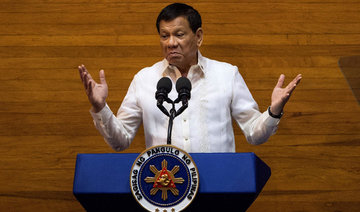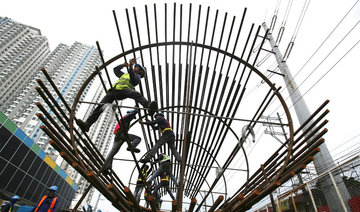MANILA: The Philippines said Friday it has dropped a tax evasion case against the country’s number-two cigarette manufacturer after it was sold to Japan Tobacco to raise funds for a record 30 billion-peso (SR220.8 million) settlement.
Manila had accused Mighty Corp. of using counterfeit tax stamps to avoid paying 37.88 billion pesos in taxes, and threatened it with criminal charges.
However in July, President Rodrigo Duterte ordered the finance department to accept a settlement, under which Mighty, which has 23 percent of the local cigarette market, would drop out of the tobacco business.
“We could consider this case as closed. (The) government of the Philippines is 40 billion pesos richer,” Justice Secretary Vitaliano Aguirre told reporters.
The company settled the case with a 30-billion-peso payment, and paid another 10 billion pesos in taxes and penalties, he explained.
Mighty had originally offered a 25-billion-peso settlement, Aguirre added.
The company sold off its assets to Japan Tobacco International in order to meet its tax deficiencies, the finance department said earlier.
The Japanese firm, one of the world’s biggest tobacco companies, whose global brands include Winston and Camel, announced on August 22 that it was purchasing Mighty for 46.8 billion pesos.
Asked to comment on the justice department decision, a Japan Tobacco spokesman in Japan said “the tax liability is an issue that should be solved appropriately between Mighty Corp. and the Philippine government.”
Philippine tobacco giant pays $586 million to settle tax case
Philippine tobacco giant pays $586 million to settle tax case

Reforms target sustained growth in Saudi real estate sector, says Al-Hogail

RIYADH: The Real Estate Future Forum opened its doors for its first day at the Four Seasons Riyadh, with prominent global and local figures coming together to engage with one of the Kingdom’s most prospering sectors.
With new regulations, laws, and investments underway, 2026 is expected to be a year of momentous progress for the real estate sector in the Kingdom.
The forum opened with a video highlighting the sector’s progress in the Kingdom, during which an emphasis was placed on the forum’s ability to create global reach, representation, as well as agreements worth a cumulative $50 billion
With the Kingdom now opening up real estate ownership to foreigners, this year’s Real Estate Future Forum is placing a great deal of importance on this new milestone and its desired outcomes and impact on the market.
Aside from this year’s forum’s unique discussions surrounding those developments, it will also be the first of its kind to launch the Real Estate Excellence Award and announce its finalist during the three-day summit.
Minister of Municipalities and Housing and Chairman of the Real Estate General Authority Majed Al-Hogail took to stage to address the diverse audience on the real estate market’s achievements thus far and its milestones to come.
Of those important milestones, he underscored “real estate balance” as a key pillar of the sector’s decisions to implement regulatory tools “with the aim of constant growth which can maintain the vitality of this sector.” He pointed to examples of those regulatory measures, such as the White Land Tax.
On 2025’s progress, the minister highlighted the jump in Saudi family home ownership, which went from 47 percent in 2016 to 66 percent in 2025, keeping the Kingdom’s Vision 2030 goal of 70 percent by the end of the decade on track.
He said the opening of the real estate market to foreigners is an indicator of the sector’s maturity under the leadership of Crown Prince Mohammed bin Salman. He said his ministry plans to build over 300,000 housing units in Riyadh over the next three years.
Speaking to Arab News, Al-Hogail elaborated on these achievements, stating: “Today, demand, especially local demand, has grown significantly. The mortgage market has reached record levels, exceeding SR900 billion ($240 billion) in mortgage financing, we are now seeing SRC (Saudi Real Estate Refinance Co.) injecting both local and foreign liquidity on a large scale, reaching more than SR54 billion”
Al-Hogail described Makkah and Madinah as unique and special points in the Kingdom’s real estate market as he spoke of the sector’s attractiveness.
“Today, the Kingdom of Saudi Arabia has become, in international investment indices, one that takes a good share of the Middle East, and based on this, many real estate investment portfolios have begun to come in,” he said.
Al-Ahsa Gov. Prince Saud bin Talal bin Badr Al-Saud told Arab News the Kingdom’s ability to balance both heritage sites with real estate is one of its strengths.
He said: “Actually the real estate market supports the whole infrastructure … the whole ecosystem goes back together in the foundation of the real estate; if we have the right infrastructure we can leverage more on tourism plus we can leverage more on the quality of life … we’re looking at 2030, this is the vision … to have the right infrastructure the time for more investors to come in real estate, entertainment, plus tourism and culture.”












